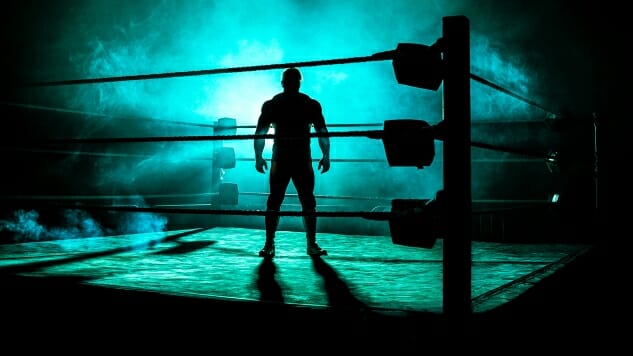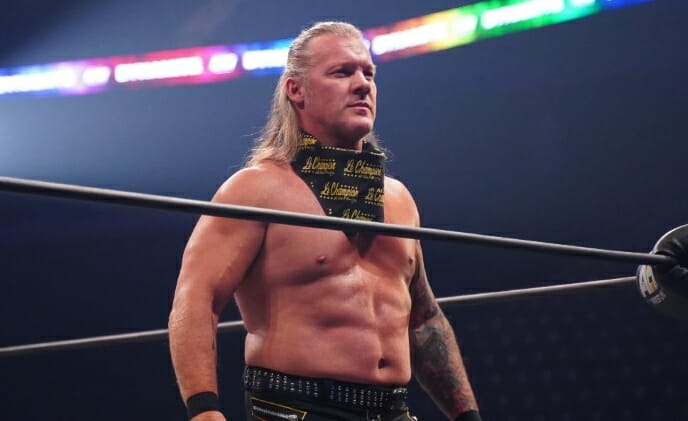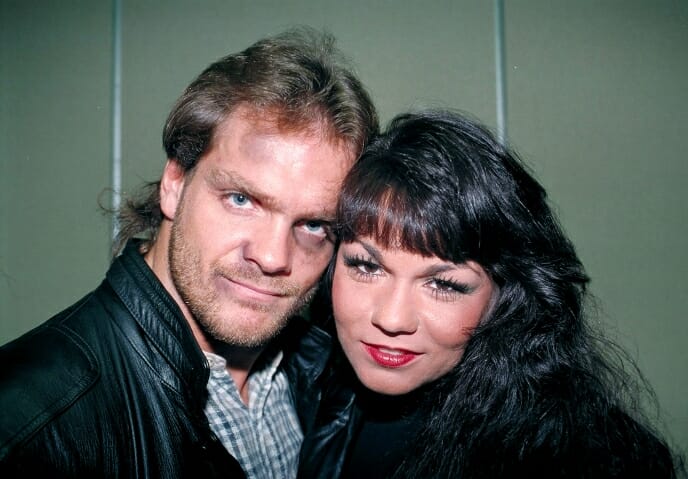Chris Jericho Discusses Chris Benoit and Vice’s Dark Side of the Ring
Photos courtesy of Vice, except Chris Jericho photo courtesy of AEW TV Features Dark Side of the Ring
When Vice launched a pro wrestling documentary series on its TV channel last year, wrestling fans and insiders had a reason to fear the worst. It’s too easy to sensationalize the violence and tragedy that has flared up within this unusual business, and to treat the entire concept of wrestling as something to be mocked and looked down upon. Dark Side of the Ring didn’t do either, though. That first season featured a series of respectful, well-produced documentaries that helped fill in some of the gaps of wrestling history for fans new and old alike. It didn’t just stick to the most famous wrestlers, and unlike most mainstream media about wrestling, it didn’t suffer under the delusion that WWE—and WWE only—was the entire wrestling business. From the start Dark Side of the Ring has tried to present a historically accurate account of a wide range of subjects, eschewing the distorted history of wrestling presented by WWE. In doing so it earned the respect of those who would have been its toughest critics—wrestling historians, fans, and some of the wrestlers themselves.
This week the show returns to Vice TV with a second season of 10 episodes, starting with this week’s premiere of a two-part episode about Chris and Nancy Benoit. This is the greatest tragedy of modern wrestling, an endlessly depressing case of a wrestler beloved by hardcore fans who murdered his wife (who was also a fantastic performer) and their seven-year-old son before taking his own life. Much has been written and said about the Benoit murder-suicide over the last 13 years, but Dark Side of the Ring presents the most definitive—and emotionally devastating—account so far. It’s greatly helped by the thoughts and memories of some of Benoit’s closest friends, including Chavo Guerrero, Dean Malenko, Vickie Guerrero, and Chris Jericho, who all appear throughout to candidly discuss their relationships with the Benoits. More poignantly, Chris Benoit’s first son, David Benoit, and Nancy’s sister Sandra Toffoloni are also extensively interviewed, deepening the emotional impact of this terrible story. Much time is devoted to the life and death of Eddie Guerrero, Chris Benoit’s best friend, whose untimely death in 2005 impacted Benoit deeply and permanently. It also digs into the concussion controversy that has surged through the sports world over the last 15 years, exploring the impact CTE and wrestling’s love of chair shots and other dangerous spots had upon Benoit’s brain. Despite its relatively short running time of just under 90 minutes, Dark Side of the Ring does a thorough job with this story, focusing on the careers of both Nancy and Chris, their relationships with their family, the impact Eddie’s death had on Chris, the events of that fateful weekend in 2007, and how the wrestling business has changed in their wake. If you haven’t seen it, you need to track it down; the full episode is currently streaming on Vice’s YouTube channel, split into two separate videos.
Chris Jericho’s involvement with the show runs deeper than this one episode. The AEW and New Japan Pro Wrestling star serves as the narrator for the rest of the season, stepping in for Dutch Mantell, who narrated the first year. You won’t hear his narration in the Benoit episode—and he addresses why in our interview below—but his familiar voice will act as our guide through future episodes about such subjects as the murder of Dino Bravo, the tragic death of Owen Hart, the crimes of New Jack, and more. Paste recently talked to Jericho about Dark Side of the Ring and the Benoit tragedy, and if you’ve seen the Benoit episode or are familiar with the story, you need to see what Jericho had to say about them.

Paste: So you’ll be narrating this season, which I didn’t realize when I watched the Chris Benoit episode. That episode doesn’t have any narration; why is that, and how much narration can we expect the rest of the season?
Chris Jericho: I think because I was in it. And the story kind of told itself, the way that it was put together. I found that when we did the 10 episodes that the ones that had the more riveting stories kind of told themselves and didn’t need as much piecing together through a narrator, whereas some of the ones that were a little bit weaker, shall we say—and ALL of them are good but there are some that—to put together a 45 minute piece, some of them need a little more directional introspection from a narrator than other ones do.
Paste: What can viewers expect from your narration? How different will it be in tone from Dutch Mantell’s first season narration?
Jericho: I’m not Dutch Mantell, so there’s a different style that I have of talking, but the narrator’s not there, in wrestling terms, to get himself over. The narrator is there to move the story along and try to put together any missing pieces that there might be, so I find the more conversational that you do the more it fits the tone of the piece.
Paste: You’re known as one of the more well-spoken and creative people in the business. Did you have any input into the scripts for your narration?
Jericho: No, not really. In this case I was hired to do a… and I wasn’t originally attached to it when I did the interview for the Benoit piece, so it was kind of afterward. And I think because too it’s a Canadian company, the fact that I’m Canadian, you know, there’s probably reasons for that from that aspect as well. Whenever you have a Canadian production they always want to have as many Canadians involved as possible. I’d seen season one of the show and really enjoyed it, so I thought I’d have some fun doing it, and learn. I enjoy the history of the wrestling business as well. It was cool in a lot of different ways.
Paste: What was the general impression of that first season within the business? How did wrestlers react to it?
Jericho: I would think [wrestlers are a fan of the show.] I didn’t really talk to—I know a lot of fans liked it, kind of the insiders, liked it… It gives you a chance to learn about some of these legendary stories that you may have heard a lot about, you may have heard nothing about, you may think you know the story but you’re hearing different versions of it, so there’s a lot of those types of things that I thought were really interesting. It was a lot of fun to be involved and very interesting too.
Paste: That Gino Hernandez episode was especially good. It filled in a hole in wrestling history, kind of. I’m old enough where I remember reading about him in the Apter mags but was never able to actually see him on TV.
Jericho: That’s one of those things that growing up in Canada I never saw Gino Hernandez. I read a little about him in Pro Wrestling Illustrated and those types of magazines but I didn’t know anything about him other than that he was good and had died very young. So delving into that story a lot more was very interesting for me. Probably my favorite one of the first season because it’s the one story I really knew nothing about.
Paste: So the first episode is about Chris and Nancy Benoit, and that’s obviously something that’s very personal for you. You’ve done a lot over the last few years to lead the conversation about that, and helping to bring attention to Benoit’s first son David and Nancy’s sister Sandra Toffoloni and putting them in touch with each other. Why is it important for you to help tell this story today?
Jericho: I think the reason I got involved in this in the first place is because Chavo Guerrero was kind of one of the associate producers. He’s one of my best friends in the business and more importantly a guy that was there with Chris and Eddie [Guerrero] and Dean [Malenko] and myself. We kind of all drove together and were really close friends. So when he was involved he called me and said “hey we’re doing this show”… I probably would never have done it if Chavo wasn’t involved and if I hadn’t already seen season one of the show and kind of knew what it was they were all about. And that’s what got me involved in it.
Chavo’s point was the story is going to be told anyways, so we might as well tell it the right way with the right people. And watching it back, I mean, it’s an incredible piece of filmmaking, it’s very heavy, it’s very riveting, it’s very emotional, very sad, but at least it was done the right way for the right people.
Paste: And by ‘the right people’, you mean the survivors?
Jericho: Well not the survivors, you could have anybody on there as a survivor, I’m talking about the close friends, Dean, Jericho, Chavo, Vickie [Guerrero], and also of course having Sandra and David involved for the first time ever really speaking about it—that’s something you’ve never seen before and will never see again, these people telling their stories.

Paste: One thing briefly touched on in the show is Benoit’s erasure from wrestling history. How important is it to revive memory of his actual art? Is that something that even needs to be thought about?
Jericho: I don’t know, man. It’s a weird thing. I’m not doing this to glorify a murderer but I’m also not doing this to wash away the things that he did. I think it’s a personal choice. If you were someone that didn’t know Chris Benoit you might want to study his matches because he was one of the greatest of all time. There’s no doubt about that. No matter what he did in the last weekend of his life, as a professional there were none better. If you didn’t know him, I would say you should watch and learn from him, the way he moved, his intensity, his psychology, his thought process. Where it becomes harder is if you knew him, or if you were there or around or involved or a wrestling fan in 2007, when this went down.
I would say probably 10, 15 years from now—even now—you’re going to have a whole generation of performers that weren’t really fans back then, or might not have really known the true story, that won’t care as much. They’ll want to watch his matches and just try to learn and see what he did and what he was. It’s probably like—I don’t know anybody that knows Phil Spector. I’m a huge fan of his work. I’m a huge fan of Michael Jackson’s work. If I was involved more in their controversial histories, I might say I’m never going to listen to another Phil Spector song again. And it’s kind of like that with Chris Benoit, I don’t know if I really want to go back and watch those matches even though they’re so connected to me in so many ways. It’s hard to do. But I don’t blame other people for doing it, because those matches are great examples of what perfect pro wrestling is.
Paste: You were obviously super close with Chris and Eddie; you traveled with them, you came up with them, you were lumped together with them by fans and within the business. You’re now almost 50 and having the best run of your career. Do you ever wonder why things turned out so differently for you?
Jericho: The one thing that I avoided, and I’m not saying those guys were, but I was never a drug guy. I was never heavy into steroids—dabbled in, as everybody kind of did in that time frame, but never really—I found I was always kind of the same if I was on it or if I wasn’t. Never got into any other drugs or pills or anything like that. And probably learned a lot from what happened with Chris and Eddie, as did the entire business. The one positive you can take from both of their untimely deaths is that the whole business has changed as far as how we work in the ring, how we’re treated outside the ring, the substance testing, physical testing, concussion testing, heart testing—all of those things are still focused on now, and they weren’t necessarily then before those guys passed away. So it’s one of those things—how did Ozzy and Keith Richards and Lemmy live to 70, and Jim Morrison died at 27? Who knows, some people just have different constitutions, and God has decided that we have to stay around a little longer. I don’t really think about it but I’m glad I’m on this side.”
Paste: At the end of the Benoit episode there’s a montage of unprotected chair shots to the head from the ‘90s and early ‘00s. As a fan of wrestling my entire life I can not watch that without feeling tremendous guilt that I supported something like this. As a performer, how does it feel to watch footage like that, of things that you had done to you, and that you did to others back in the day?
Jericho: It’s ridiculous. It’s ridiculous. And the thing is, no-one’s doing that unknown. It was a badge of honor, you just grit your teeth and take a chair shot. I remember, like, “hit me as hard as you can”—you’d just fucking sit there and take it. Watching it back now is like watching hockey goalies playing with no masks—like, what were you doing? And you’d be sitting there going, I don’t know. I don’t know what I was doing. It’s just the way it was. Thankfully a lot of us didn’t end up in the same position that a guy like Chris did, because we were all taking just as many chair shots. Just as many, if not more. I look back on it as almost embarrassing to see, it’s hard to watch, but thankfully we never ever have to worry about that sort of violence again.
Senior editor Garrett Martin writes about videogames, comedy, travel, theme parks, wrestling, and anything else that gets in his way. He’s also on Twitter @grmartin.